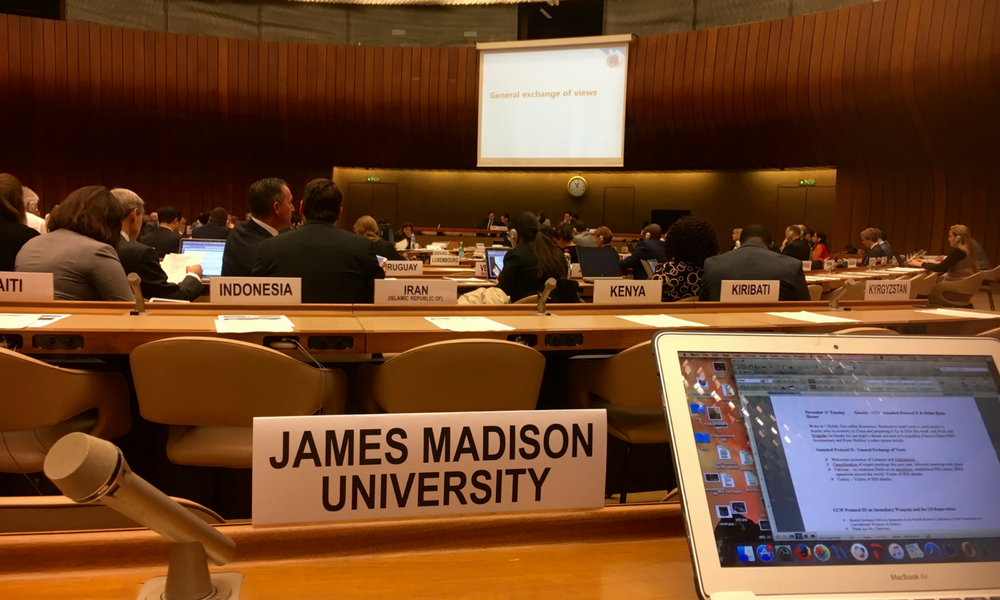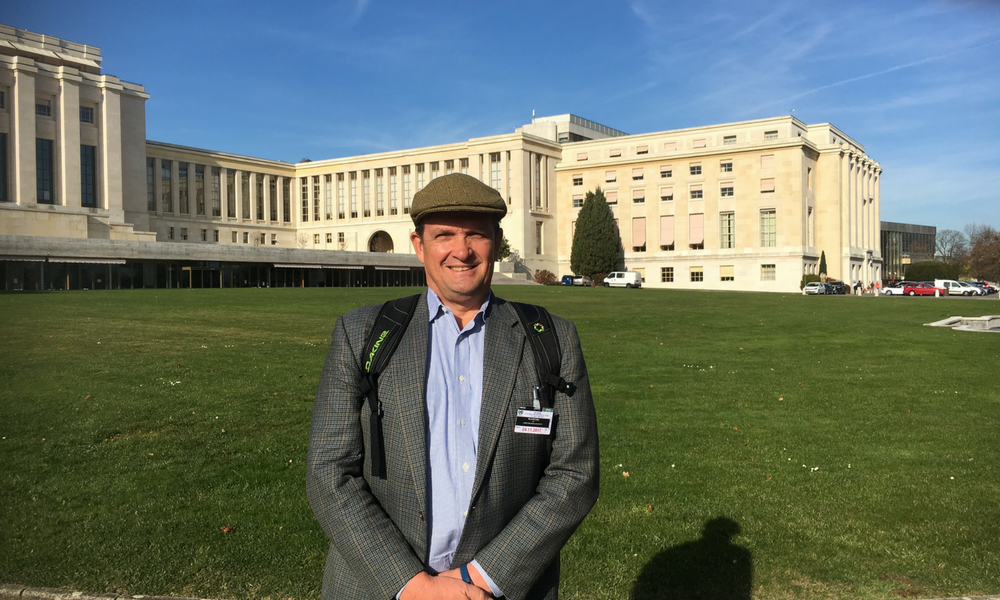JMU attends United Nations convention
Professor Rutherford participates in the Convention on Conventional Weapons in Geneva
JMU News
Housed at JMU since 1996, the Center for International Stabilization and Recovery (CISR) develops and implements programs with JMU faculty and students, disability rights organizations, and international bodies charged with clearing land contaminated with explosive remnants of war (ERW). These programs move society closer to a world where people can build peaceful and prosperous futures free from the repercussions of conflict and disaster. Serving as a thought leader for this global community of practice, CISR produces three annual editions of The Journal of Conventional Weapons Destruction, which is the longest continuous source of information on conventional weapons destruction programs in the world and is read in more than 150 countries.
Dr. Ken Rutherford, Director of CISR and JMU Professor of Political Science, recently traveled to Geneva to participate in the “Nineteenth Annual Conference of the High Contracting Parties to Amended Protocol II to the Convention on Prohibitions or Restrictions on the Use of Certain Conventional Weapons Which May Be Deemed to Be Excessively Injurious or to Have Indiscriminate Effects.” The meetings took place at the Palace of Nations (Palais des Nations), which is the former home of the League of Nations and current United Nations Office at Geneva.
 |
| CISR Director Dr. Ken Rutherford at the Palace of Nations (Palais des Nations), formerly the headquarters of the League of Nations and now the home of the United Nations Office at Geneva. November 21, 2017. |
Rutherford’s own identity as a landmine victim and survivor has inspired much of his work and passionate advocacy. Rutherford was injured in 1993 and has been attending CCW conferences on and off since 1995. In 2008, he made the first and potentially only official speech on victim rights during the Explosive Remnants of War Protocol V negotiations. The victim assistance message became an integral factor during the drafting of the Convention on the Rights of Persons with Disabilities.
During the 2017 CCW, Rutherford attended discussions regarding the tightening of protocol language in order to address particular weapons, such as Lethal Autonomous Weapon Systems (LAWS), which have presented an increasing concern in recent years. Currently, Human Rights Watch, an international NGO, is calling for LAWS to be covered in a new protocol – Protocol VI. Also up for debate were IEDs (Improvised Explosive Devices) and how to address their negative humanitarian impact using the most appropriate legal avenue.
Rutherford stated that, unfortunately, it takes quite a while for change to occur because the CCW requires participants to reach consensus before a protocol is implemented or altered, which is particularly challenging given that there are more than 190 member states. In the words of Rutherford, “You are only as progressive as the least progressive member.” James Madison University was one of only two universities, and the only from the U.S., represented at the meeting. The University of Melbourne also participated. Later this month Rutherford will travel to Vienna, Austria for The Sixteenth Meeting of States Parties (16MSP) to the Mine Ban Treaty.
In addition to international advocacy, Rutherford is working on the first comprehensive analysis of landmine use during the U.S. Civil War – America’s Buried History: Landmines in the Civil War. It would surprise many that the first person to be killed by a landmine in the Western Hemisphere was a Union cavalry officer on May 5, 1862 in Yorktown, Virginia. After the Civil War, landmines became a major component of land warfare by most major militaries and has resulted in hundreds of thousands of casualties, peaking in the 90s when landmines killed an estimated 26,000 people each year.
